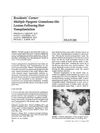 2 citations,
May 2023 in “Frontiers in immunology”
2 citations,
May 2023 in “Frontiers in immunology” Skin stem cells remember past inflammation, helping them respond better to future injuries and possibly aiding in treating skin issues.
 2 citations,
October 2015 in “Human Gene Therapy”
2 citations,
October 2015 in “Human Gene Therapy” The congress highlighted new gene therapy techniques and cell transplantation methods for treating diseases.
 43 citations,
February 2020 in “Clinica chimica acta”
43 citations,
February 2020 in “Clinica chimica acta” Nano-sized plant-based chemicals could improve cervical cancer treatment by being more effective and causing fewer side effects than current methods.
 2 citations,
January 2014 in “Springer eBooks”
2 citations,
January 2014 in “Springer eBooks” The book details skin conditions in older adults, their link to mental health, cancer treatment importance, hair loss remedies, and managing autoimmune and itchy skin.
 January 2024 in “Wiadomości Lekarskie”
January 2024 in “Wiadomości Lekarskie” Robotic hair transplantation with AI offers more reliable, precise, and efficient hair restoration.
 August 2017 in “Journal of epidemiological research”
August 2017 in “Journal of epidemiological research” Cancer rates are increasing in developed countries, with estrogen, aging, low vitamin D3, and HPV infection as common causes.
 489 citations,
November 2021 in “Signal Transduction and Targeted Therapy”
489 citations,
November 2021 in “Signal Transduction and Targeted Therapy” The JAK/STAT pathway is important in cell processes and disease, and JAK inhibitors are promising for treating related conditions.
37 citations,
November 2017 in “Medical Sciences” Melanoma's complexity requires personalized treatments due to key genetic mutations and tumor-initiating cells.
 January 2021 in “Springer eBooks”
January 2021 in “Springer eBooks” Different rheumatological diseases can cause specific skin problems.
 16 citations,
October 2023 in “Molecular cancer”
16 citations,
October 2023 in “Molecular cancer” New treatments like nanotechnology show promise in improving skin cancer therapy.
8 citations,
May 2024 in “Diagnostics” AI chatbots can help teach dermatology but need careful checking for accuracy.
28 citations,
May 1998 in “Journal of the American Academy of Dermatology” Scalp inflammation can cause multiple hairs to grow from one follicle.
 8 citations,
October 2022 in “International Journal of Molecular Sciences”
8 citations,
October 2022 in “International Journal of Molecular Sciences” Self-amplifying RNA could be a better option for protein replacement therapy with lower doses and lasting effects, but delivering it into cells is still challenging.
 1 citations,
June 2023 in “Cells”
1 citations,
June 2023 in “Cells” Exosomes could be a promising way to help repair skin and treat skin disorders.
 March 2014 in “Journal of The American Academy of Dermatology”
March 2014 in “Journal of The American Academy of Dermatology” The document lists various dermatology topics, treatments, and diagnostic methods.
 5 citations,
January 1985 in “The Journal of Dermatologic Surgery and Oncology”
5 citations,
January 1985 in “The Journal of Dermatologic Surgery and Oncology” A man developed unusual growths after a hair transplant, which were treated successfully with no recurrence after a month.
 2 citations,
February 2009 in “Journal of the American Academy of Dermatology”
2 citations,
February 2009 in “Journal of the American Academy of Dermatology” Many research paper titles in dermatology journals lack scientific precision.
 1 citations,
January 2023 in “IEEE access”
1 citations,
January 2023 in “IEEE access” Deep learning helps detect skin conditions and is advancing dermatology diagnosis and treatment.

The document provides 70 multiple choice questions to improve haematology skills.

The document tests knowledge and decision-making in hematology through multiple-choice questions.
 April 2024 in “Public health”
April 2024 in “Public health” Vaccination and timely treatment reduce the risk of long COVID.
 2 citations,
August 2022 in “JAAD case reports”
2 citations,
August 2022 in “JAAD case reports” COVID-19 vaccines may rarely worsen hair loss in people with severe alopecia, but the benefits of vaccination still outweigh this risk.
 63 citations,
March 2016 in “International Journal of Molecular Sciences”
63 citations,
March 2016 in “International Journal of Molecular Sciences” Children with atopic dermatitis often have sleep problems due to itching and may benefit from melatonin, which helps with sleep and skin symptoms.
 19 citations,
June 2001 in “Annals of Internal Medicine”
19 citations,
June 2001 in “Annals of Internal Medicine” Tamoxifen can cause total hair loss but its benefits outweigh this side effect.
 5 citations,
June 2001 in “Annals of Internal Medicine”
5 citations,
June 2001 in “Annals of Internal Medicine” Rituximab effectively treated a woman's bone lymphoma that was resistant to other treatments.
 1 citations,
June 2001 in “Annals of Internal Medicine”
1 citations,
June 2001 in “Annals of Internal Medicine” Troglitazone increases subcutaneous fat in lipodystrophy patients.
 1 citations,
June 2001 in “Annals of Internal Medicine”
1 citations,
June 2001 in “Annals of Internal Medicine” The conclusion is that maintaining blinding in clinical trials is crucial for reliable results.
 June 2001 in “Annals of Internal Medicine”
June 2001 in “Annals of Internal Medicine” The document concludes that more research is needed on the hepatitis B vaccine's side effects and the effectiveness of certain treatments for specific diseases.
 June 2001 in “Annals of Internal Medicine”
June 2001 in “Annals of Internal Medicine” The conclusion suggests that the zinc lozenge study is valid despite imperfect blinding, as many participants could not correctly identify their lozenge type.
 10 citations,
September 2022 in “Psychiatry and Clinical Neurosciences”
10 citations,
September 2022 in “Psychiatry and Clinical Neurosciences” Long COVID affects over half of COVID-19 survivors, causing a range of symptoms like fatigue and neurological issues, with no specific treatment yet.



























